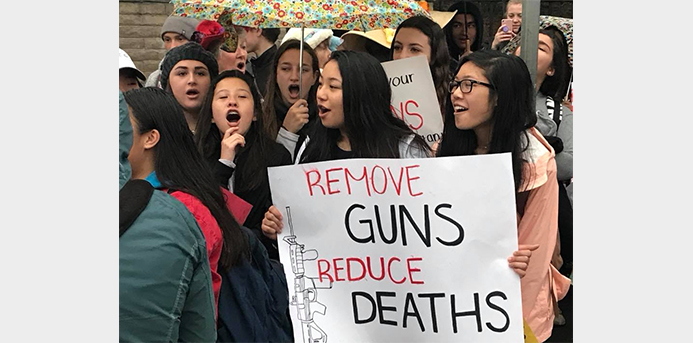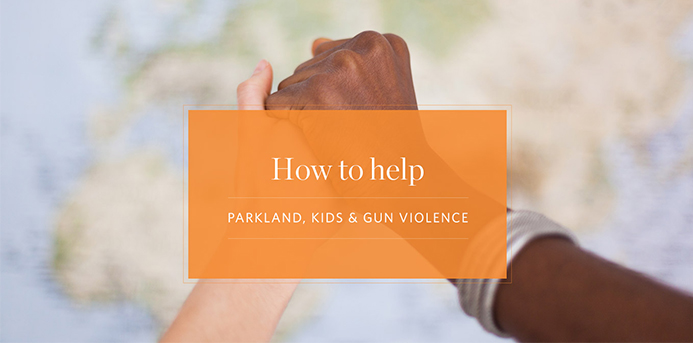The Feb. 14 shooting at Marjory Stoneman Douglas High School in Parkland Florida, which killed 17 students and faculty and injured 17 others, was yet another devastating moment in the chronology of mass shootings here in the United States.
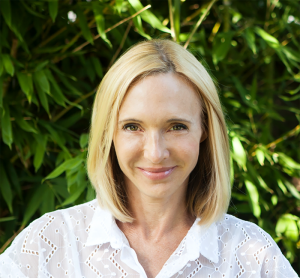
The shooting hits close to home for Liz Fiorentino, a Menlo Park art director and mother of three. In 1990, her friend Nick Sheehy was killed by a mentally ill man with an assault weapon in Henry’s Bar in Berkeley. Soon after, Fiorentino and three other friends of Sheehy’s, all in their early 20s at the time, flew to Washington, D.C. to lobby congress to support the Brady Bill, which specified waiting periods and background checks for firearms, including assault weapons.
The Next Generation of Activists
Fast forward 27 years, with assault weapons more prevalent and destructive than ever in American society, and Fiorentino’s 14-year old daughter, a freshman at Gunn High School in Palo Alto, has taken the helm from her mom. “She came home from school after the Parkland shooting and basically said, ‘step aside, let the kids take over,’” says Fiorentino.
It’s hard to imagine that almost three decades after Fiorentino and others poured their hearts out to politicians in Washington, D.C., begging desperately for them to do something to reduce access to guns, things have only gotten worse. Fiorentino remembers the responses of defensive politicians when her group knocked on their doors in the capital. “It was the same types of things you hear today … the response is anger, and ‘you’re not going to take our guns away,’” she recalls. “We even got, ‘you know this bill is not going to bring your friend back.’”
The 19-year-old Florida gunman had a long history of emotional and disciplinary problems, as did the gunman who killed Fiorentino’s friend Sheehy. Like the Henry’s Bar assailant, the Florida shooter had easily purchased the automatic weapon that ended the lives of so many people. The tragedy, one of at least 14 school shootings already in 2018, seems to have been the final straw for students like Fiorentino’s daughter. Their feelings are summarized by the viral hashtags #Enough and #NeverAgain. Youth across the country are following the lead of outraged Florida school shooting survivors, and are taking things into their own hands; in their view, adults have not done enough to protect them from the assault weapons that have somehow become part of the fabric of life in the United States.
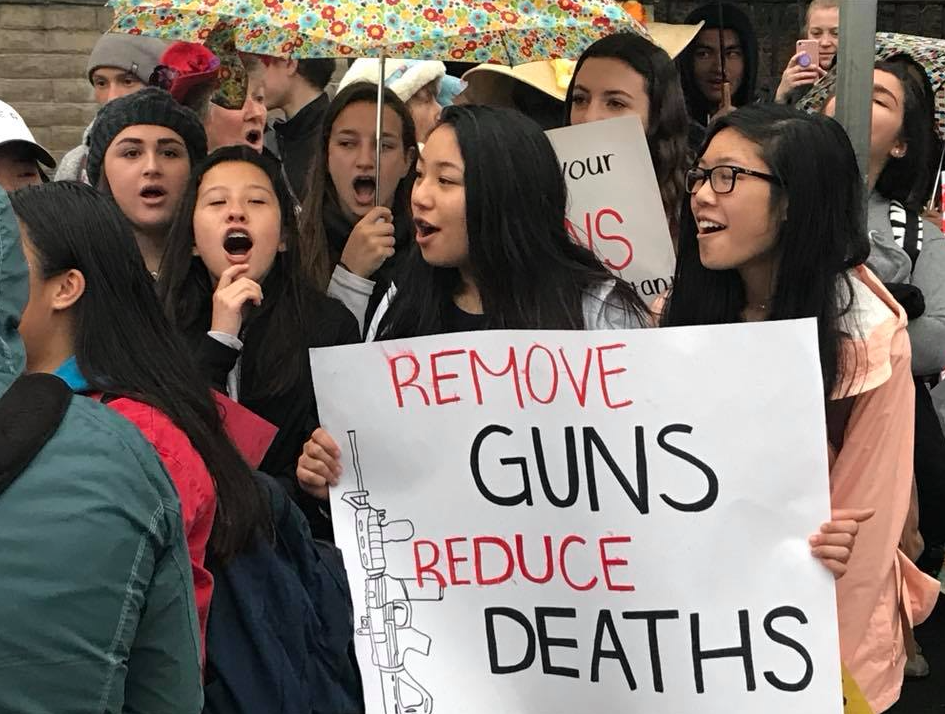
Taking Action
Twelve days after the Parkland shooting, Fiorentino’s daughter and fellow Gunn High students participated in a protest on the street in front of their school carry signs such as “Protect children, not guns,” and “We want education, not fear of annihilation.” In response to the National Rifle Association (NRA) and President Trump’s suggestion to arm teachers with guns, they chanted in response “More money, not guns!”
Student protesters were joined by a brigade of “Raging Grannies” who came out with their own signs. Across the Bay Area, students, and the adults who support them, are following the lead of educated and articulate Marjory Stoneman Douglas survivors who have called on Americans to hold politicians accountable to stand up to the NRA as it pours millions of dollars into lobbying and pro-gun campaigns and holds a rigid stance against any assault weapon ban. Local middle and high school students have rapidly organized, protested, walked out, spoken on radio and television shows, created email campaigns and captured the attention of local and national representatives. In Santa Clara, the Board of Supervisors has voted to host a gun violence summit in response to student outcry. In Marin County, upset sixth graders at Lagunitas Middle School wrote so many emails to U.S. representative Jared Huffman that he showed up in their class the next day to pledge his commitment to assault weapon bills and a “national standard” for gun control in all states.
“These Florida teenagers and the student activists across the country are breaking through the stagnation and it’s incredibly inspiring,” says Jen Reidy, who has served as the Marin County chapter lead for Moms Demand Action for Gun Control and currently works for the Brady Campaign to Prevent Gun Violence. “This is what momentum feels like.”
The national post-Parkland student gun control activism agenda began with a CNN town hall in which Florida congressman Marco Rubio was asked directly whether he would continue to take money from the NRA. That was followed by protests in the capitol building in Tallahassee, Florida on Feb. 21 and the #Enough National School Walkout on March 14. It will also be addressed at the upcoming March For Our Lives on March 24 in Washington, D.C. and other capitals around the country, a movement which has received millions of dollars of support from celebrities such as George and Amal Clooney and Oprah Winfrey. Then, on April 20, the 20th anniversary of the Columbine, Colorado school shooting, students have planned a second walkout to keep attention focused on government actions. Simultaneously, over the past month, as student groups put pressure on businesses with ties to the NRA, corporations are making moves: Dicks Sporting Goods, REI and Delta Airlines have all severed ties with the NRA and suppliers who work with the NRA. The call for national boycotts is building — and it is hard not to be impressed with the students’ tenacity and multi-layered approach to activism.
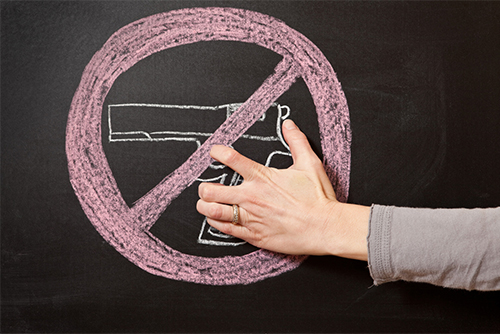
“The Parkland shooting was a catalyst for action after a long, stagnant reaction to gun violence prevention in America,” says Marin Academy (Marin County) senior Adam Friedman. “It has been a very productive time of action that came out of something very terrible.” Friedman has been working on gun violence prevention for years, participating regularly in the Everytown for Gun Safety and Moms Demand Action events and Do Not Stand Idly By. “We are looking for tangible actions,” he says. “We are focusing on the Brady background checks, empowering police officers and the FBI to intervene when an individual is seen as dangerous, and securing a national ban on assault weapons. At ground level here in the Bay Area, I am working with a coalition of teens, and we now have 25 to 30 schools involved to ensure voter education and registration efforts accompany the walkouts and marches in the coming months.”
Friedman, who has turned 18, says he is “very excited” about voting in the upcoming elections. He was instrumental in orchestrating his school’s approach to the March 14 walkout, planning voter registration of juniors and seniors and letter-writing campaigns for freshman and sophomores. “We live in an era defined by the issue and it is our generation’s issue to fix. We’re saying enough is enough and taking a stand now.” Students, who are well aware of the fact that many of them will be able to vote in the next mid-terms, are capitalizing on the pre-existing Power To The Polls campaign created by the organizers of the national Women’s March movement.
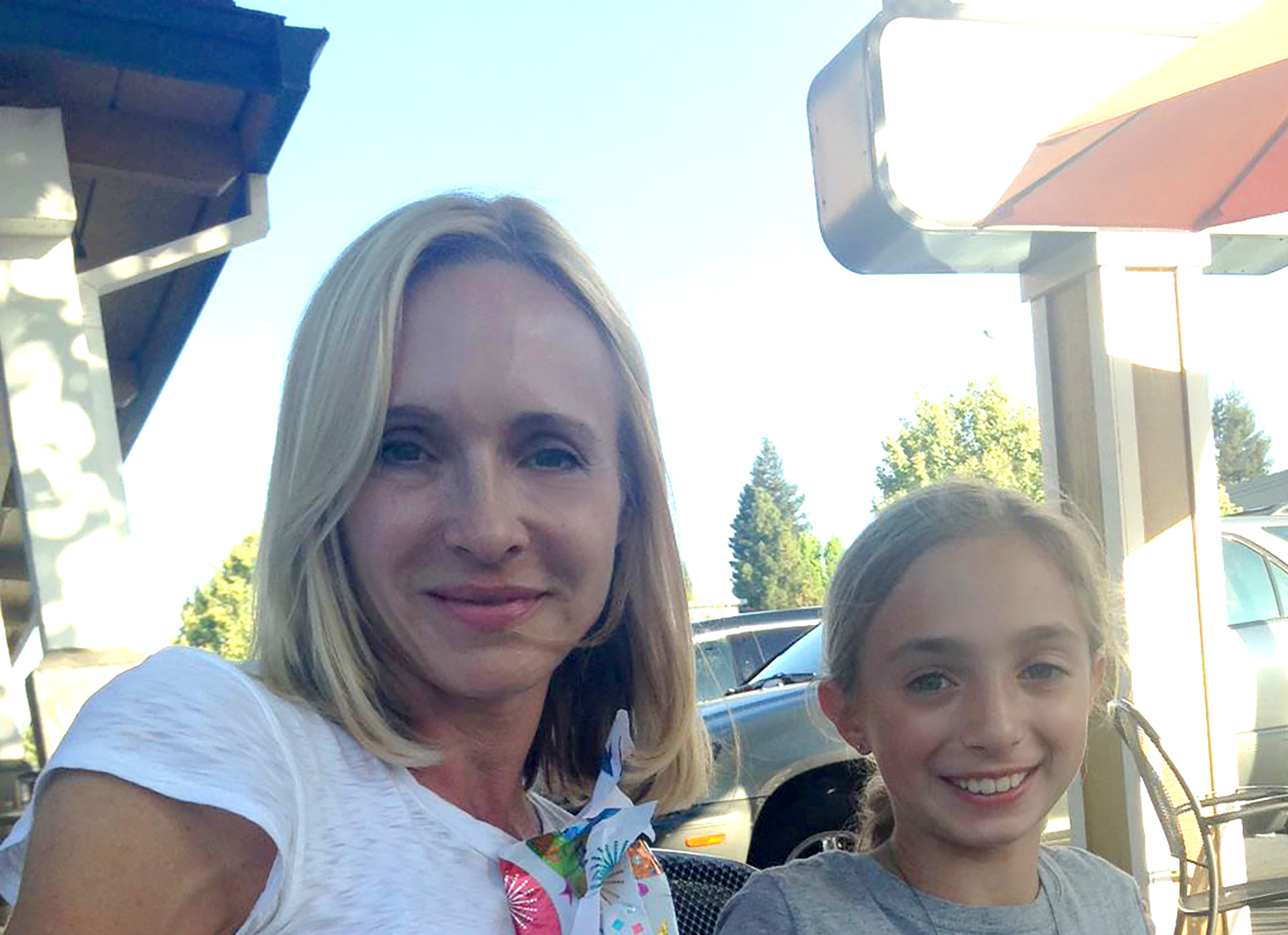
Youth-Led, Adult-Backed
Each Bay Area school, indeed each school across the country, has taken a unique approach to protests and the #Enough National School Walkout. Almost without exception, the faculty and staff have been behind the student activities. Marin County Sheriff Robert Doyle expressed his support for the walkout, saying in a press release: “We are proud to see our youth leading these efforts and we support the ultimate goal of keeping our schools and our communities free from gun violence.”
“The students are concerned and the teachers are concerned as well,” says 2017 Marin County Teacher of the Year Jennifer Marsh Russell from Novato High School. Russell says she and other teachers are holding conversations amongst faculty and staff about the way to best support the students and create a sense of safety and preparedness on campus. Since Parkland, the Marin County Office of Education and other districts around the Bay Area have held school shooter safety courses. Russell is also looking at other national training options through an organization called ALICE, which offers active shooter response training for civilians. Meanwhile, teachers are spending money on things like magnets that they can peel off to automatically lock their doors from the inside if they cannot immediately find their keys during a lockdown. “It is scary and it is heavy on everybody’s mind,” says Russell. “It’s terrible that they have to deal with this, that it is part of their narrative. It is also terrible that this is what we teachers and school districts need to spend time and money on.”
For Fiorentino, the outrage and confusion her daughter is experiencing “brings everything back,” and makes it feel like her 1990 trip to Washington just happened. Now, she and her good friend Lara Solomon, who lobbied alongside her for the Brady Bill, will travel to Washington, D.C. with their daughters to join the March For Our Lives. “In the days after Parkland, something was triggered in my daughter,” says Fiorentino. “She told me, ‘we are going to change this.’ So we, as mothers and daughters, are all going together.”
Ready to join the fight? Here are some ways you can help combat gun violence in your community.
Not sure how to talk to your kids about Parkland and other mass shootings? Here are some expert tips.
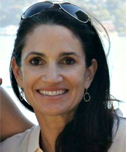 Kirsten Jones Neff is a freelance magazine writer from Northern California who writes regularly about parenting, health, the environment, and the arts. She has traveled extensively in India and Africa and has long supported the excellent work of Tangible Hope, providing education and health care to young girls in Ethiopia, and Fund-A-Field, a nonprofit that builds sports fields and creates opportunities for children to play in communities across Africa and Haiti.
Kirsten Jones Neff is a freelance magazine writer from Northern California who writes regularly about parenting, health, the environment, and the arts. She has traveled extensively in India and Africa and has long supported the excellent work of Tangible Hope, providing education and health care to young girls in Ethiopia, and Fund-A-Field, a nonprofit that builds sports fields and creates opportunities for children to play in communities across Africa and Haiti.
